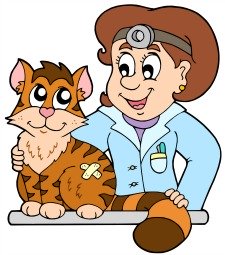How to Care for a Pregnant Cat
"Here's what you need to know..."
It's a Natural Thing
 Woody
WoodyCare for a pregnant cat can be a little tricky for a new cat parent, but here are some things to keep in mind.
Cat pregnancy is a very normal and natural phase of a healthy female cat's life. Knowing how to care for a pregnant cat will benefit both you and your female kitty ("queen").
Of course, in my personal opinion, it's best to have our female felines spayed and males neutered in order to "decrease the surplus population" of unwanted and homeless cats and kittens.
But if you find yourself in a situation where you are caring for a pregnant queen, here's some information to help you and your kitty get through this time with ease.
Keep Calm
It will be helpful for both your cat's health and you if you approach this phase in a relaxed and matter-of-fact way. If you feel anxious or nervous, your kitty will pick up on it. If this is her first pregnancy, she may already feel a little nervous and you don't want to add to it.
Try not to pamper her more than usual. Encourage her to maintain her normal lifestyle. You don't want her to become too dependent on you and think that you are going to take care of her kittens for her!
Visit Your Veterinarian

One of the best things you can do to care for a pregnant cat is take her in for a veterinary check-up.
Your veterinarian can confirm the pregnancy, tell you how far along she is, and give you advice on feeding and nutritional supplements, as well as check her overall health.
Very important: Veterinarians recommend that one of the most important ways to care for a pregnant cat and her kittens is that you do not try to feel the kittens in your cat's womb at any time during the pregnancy. Only an experienced veterinarian should do this.
Duration of Pregnancy
Feline gestation is from 63 to 68 days, although it can range from 61 to 70 days.
How to Care for a Pregnant Cat—Early Stages (up to 4 weeks)
During the early stages of feline pregnancy, you don't really need to do anything different for your cat than usual.
If she mostly stays indoors, you can continue her normal playtime with her. Again, this is a normal life process, although your kitty may be a little nervous if it's her first pregnancy.
If she is used to going outside, you should start to keep her indoors at about the sixth week. This will prevent her from looking for an outdoor nest in which to give birth to her kittens.
If the kittens are birthed outdoors, they are more susceptible to predators, among other dangers. Plus, you may not be able to enjoy watching the little guys!
How to Care for a Pregnant Cat—Later Stages (4 weeks on)
Digestion and Diet
According to "The Ultimate Encyclopedia of Cats, Cat Breeds & Cat Care," a healthy pregnant cat should not need extra food until about the last third of her pregnancy. This is the seventh through ninth week mark.
The Encyclopedia recommends frequent small meals (up to four daily). And the total amount of the food should only be increased by about one-third, although other experts say to increase the food up to 50% more than usual.
It's important to serve top-quality, nourishing and healthy cat food that is low in bulk. The smaller meals are important at this time because the fetuses are growing and space inside your kitty's belly is at a premium.
You could also consider a cat pregnancy supplement to enhance and support your feline's reproductive system before, during and after pregnancy.
Your pregnant feline may experience constipation during this time. You can help her with this by occasionally giving her oily fish such as sardines or tuna or a mild herbal remedy designed to relieve feline constipation.
If possible, keep small children away and definitely warn them not to pick her up and carry her around.
Exercise
It is important for the queen's health that she continue to get exercise during her pregnancy, even during the later stages. But you should tone it down if you usually play hard with her.
Let your kitty determine how long to play, but play regularly and gently.
Grooming During Cat Pregnancy
During the later stages, your kitty might get tired during grooming and may not be able to clean all areas. She may also be too bulky to fully take care of her grooming needs.
You can help her out with regular and gentle grooming by using something like a kitty wipe if she seems to be having a lot of trouble.
As she moves into her eighth week of pregnancy, you should check her anal area on a daily basis to help her keep clean. If she needs some help, you can use sponge with a mild soap and warm water or a kitty wipe, then dry the area with tissues.
Additional Resources
See Cat Pregnancy Symptoms for a weekly breakdown of what to expect during feline pregnancy.
Consulting with your trusted veterinarian is probably the best thing you can do to care for a pregnant cat.
Use the Search Box to find more feline info. |
From Care for a Pregnant Cat to My Healthy Cat home
If you suspect your cat is ill, please contact your veterinarian immediately.
The material presented in this site is for informational and entertainment purposes only. It is not intended to replace your veterinarian's advice.
Copyright 2003-2023 © www.myhealthycat.com
Sitemap | Contact Us | About Us | Disclosure | Privacy Policy

